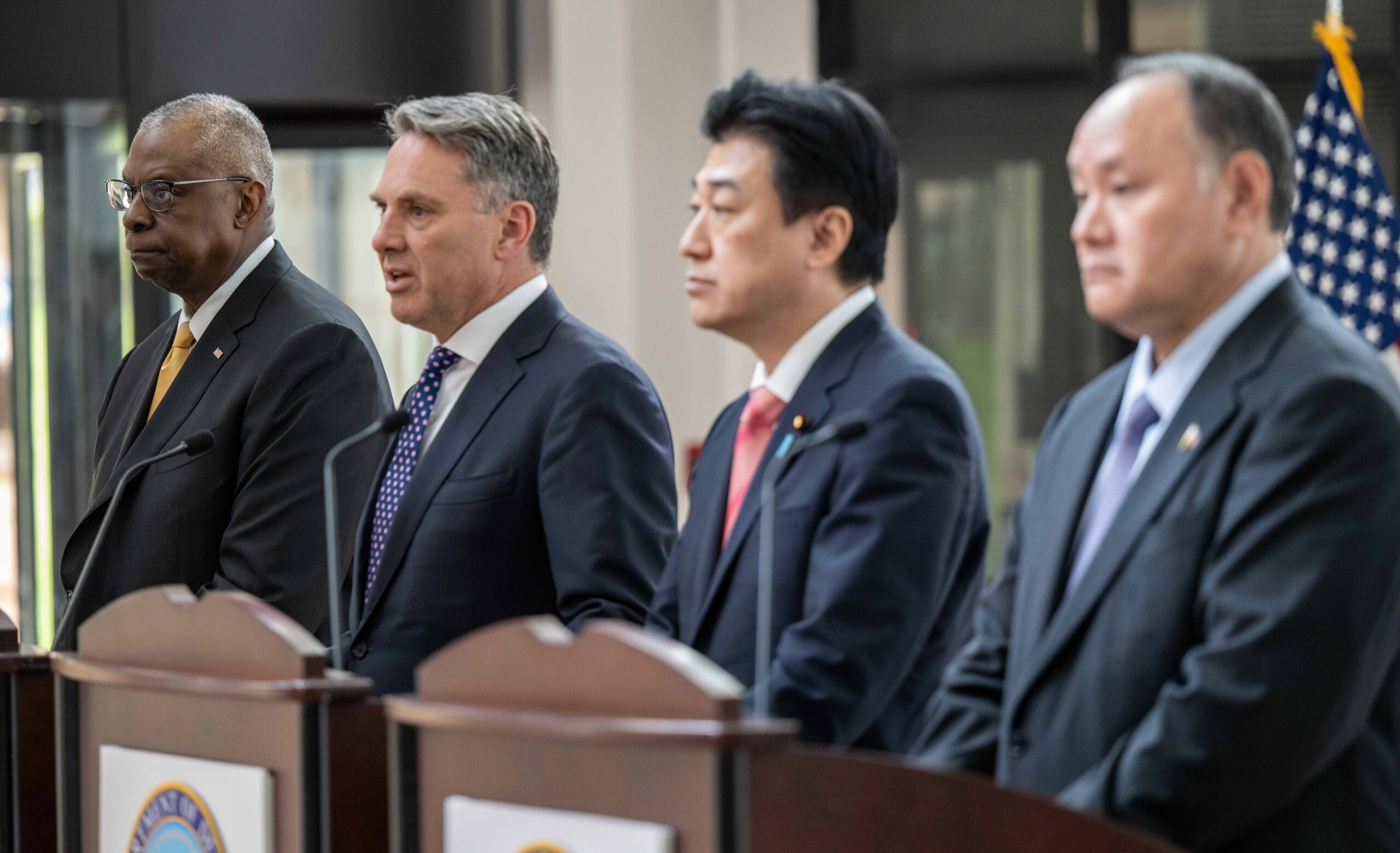
Defense chiefs from the U.S, Australia, Japan and the Philippines have agreed to increase joint activities, including military exercises, following a quadrilateral meeting on Thursday in Hawaii.
U.S. Secretary of Defense Lloyd Austin stated in a press conference following the meeting that the chiefs were meeting because all four countries shared a common vision of a free and open Indo-Pacific and their continued collaboration would lead to realizing that vision. “We also want to pursue coordinated security assistance to the Philippines that will boost interoperability and help the Philippines achieve its defense modernization goals,” said Austin.
Australian Deputy Prime Minister and Defense Minister Richard Marles added that the defense chiefs discussed increasing the tempo of defense exercises based on the bilateral reciprocal access agreements (RAAs) and the status of forces agreements that existed or were being negotiated among the four countries.
Japan Defense Minister Minoru Kihara stated that Japan was currently in negotiations with the Philippines on an RAA and the early settlement of it will further activate and vitalize the bilateral joint exercises and training of the two militaries is expected to reinforce cooperation among the four nations.
All four defense chiefs largely avoided mentioning China as the cause of the meeting, though they hinted at it indirectly, Kihara stated that the four defense chiefs expressed concerns regarding the situation in the East and South China Sea, “however, the statement is not directed towards any specific or particular nation, it is towards the nations which are trying to change the status quo by force.: Philippines Secretary Of National Defense Gilbert Teodoro stated that the underlying principle of the meeting is a shared respect for a rules‑based international order and upholding international law, “and it is safe to say that four countries, four independent countries, voicing the same message means an important thing in the face of a unilateral declaration by a single theatre actor.”
In a joint statement on the meeting, four defense chiefs expressed grave concern over the situation in the East and South China Seas and strongly objected to China’s dangerous deployment of coast guard and maritime militia vessels in the South China Sea. “They reiterated serious concerns regarding the People’s Republic of China’s (PRC) repeated obstruction of Philippine vessels’ exercise of high seas freedom of navigation and the disruption of supply lines to Second Thomas Shoal, which pose dangerous and destabilizing behavior,” read the statement. The statement also said the defense chiefs called on China to adhere to the legally binding 2016 South China Sea Arbitral Tribunal Award and pledged to support states exercising their rights and freedoms in the South China Sea.
The defense chiefs were in Hawaii, along with other regional defense ministers and senior military officers, to witness Friday’s change of command ceremony for Indo-Pacific Command, at which Adm. Samuel Paparo will assume command from Adm. John Aquilino. The ceremony attendees have taken the opportunity to hold various bilateral and trilateral meetings while in Hawaii, with the defense leaders of U.S, Australia and Japan notably holding a trilateral meeting on Thursday.
A Pentagon release stated the three defense chiefs reiterated their strong opposition to any attempts by China to unilaterally change the status quo by force or coercion in the South and East China Seas. They said this includes destabilizing actions in the South China Sea, such as unsafe encounters at sea and in the air, the militarization of disputed features and the dangerous use of coast guard vessels and maritime militia, including interference with routine maritime operations, and efforts to disrupt other countries’ offshore resource exploration. The release also stated the defense chiefs strongly object to China’s claims and actions that are inconsistent with international law.
North Korea came under condemnation by the defense chiefs for its repeated missile launches, including intercontinental ballistic missiles and other launches using ballistic-missile technology. “The Ministers strongly condemn the increasing military cooperation between North Korea and Russia, including North Korea’s export and Russia’s procurement of North Korean ballistic missiles in violation of UNSC resolutions, as well as Russia’s use of these missiles against Ukraine,” read the release.
A number of trilateral F-35 Joint Strike Fighter (JSF) training exercises will be carried out in the next two years, according to the release, including Exercise Cope North 2025 in the United States, Exercise Bushido Guardian 2025 in Japan and Exercise Pitch Black 2026 in Australia. The three countries also will continue increasing the frequency and complexity of high-end trilateral exercises in northern Australia, such as Exercise Southern Jackaroo, and the U.S. armed forces, Australian Defence Force and Japan Self-Defense Forces will conduct an inaugural regional air and missile defense live fire exercise in 2027 at Exercise Talisman Sabre in Australia. Trilateral intelligence, surveillance, and reconnaissance cooperation also will be expanded, according to the release.
The release also stated the three defense chiefs signed the trilateral Research, Development, Test, and Evaluation (RDT&E) Projects Arrangement which allows the respective defense organizations to pursue areas of interest for operationally relevant advanced collaboration.





